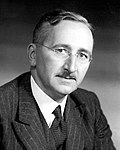Neoliberalism
Neoliberalism is a political philosophy and economic theory that advocates for the increased role of the private sector in the economy and society. It is characterized by free market policies, deregulation, privatization, and a reduction in government spending.
History[edit]
The term "neoliberalism" was first used in the 1930s by Alexander Rüstow, a German economist and sociologist, during the Colloque Walter Lippmann. The term was later popularized in the 1970s and 1980s by economists such as Milton Friedman and Friedrich Hayek, who advocated for a return to classical liberalism.
Principles[edit]
Neoliberalism is based on the principles of individualism, free trade, and competition. It argues that governments should limit their intervention in the economy, and instead, allow the market forces to determine the distribution of resources. This is believed to lead to greater efficiency, innovation, and economic growth.
Criticism[edit]
Critics of neoliberalism argue that it leads to income inequality, social exclusion, and environmental degradation. They also argue that it undermines democracy by shifting power from the public to the private sector.
Impact[edit]
Neoliberal policies have been implemented in various countries around the world, including the United States, the United Kingdom, and Chile. These policies have had significant impacts on the economy, society, and politics of these countries.
See also[edit]
-
Neoliberalism
-
Neoliberalism
-
Friedrich Hayek
-
Ludwig Erhard
-
Marshall Plan
-
Economic growth of Chile
-
Neoliberalism
-
Unemployment in Chile
-
GDP per capita in Latin America - Chile
-
Neoliberalism
-
Noam Chomsky
-
Neoliberalism
Ad. Transform your life with W8MD's Budget GLP-1 injections from $75


W8MD offers a medical weight loss program to lose weight in Philadelphia. Our physician-supervised medical weight loss provides:
- Weight loss injections in NYC (generic and brand names):
- Zepbound / Mounjaro, Wegovy / Ozempic, Saxenda
- Most insurances accepted or discounted self-pay rates. We will obtain insurance prior authorizations if needed.
- Generic GLP1 weight loss injections from $75 for the starting dose.
- Also offer prescription weight loss medications including Phentermine, Qsymia, Diethylpropion, Contrave etc.
NYC weight loss doctor appointmentsNYC weight loss doctor appointments
Start your NYC weight loss journey today at our NYC medical weight loss and Philadelphia medical weight loss clinics.
- Call 718-946-5500 to lose weight in NYC or for medical weight loss in Philadelphia 215-676-2334.
- Tags:NYC medical weight loss, Philadelphia lose weight Zepbound NYC, Budget GLP1 weight loss injections, Wegovy Philadelphia, Wegovy NYC, Philadelphia medical weight loss, Brookly weight loss and Wegovy NYC
|
WikiMD's Wellness Encyclopedia |
| Let Food Be Thy Medicine Medicine Thy Food - Hippocrates |
Medical Disclaimer: WikiMD is not a substitute for professional medical advice. The information on WikiMD is provided as an information resource only, may be incorrect, outdated or misleading, and is not to be used or relied on for any diagnostic or treatment purposes. Please consult your health care provider before making any healthcare decisions or for guidance about a specific medical condition. WikiMD expressly disclaims responsibility, and shall have no liability, for any damages, loss, injury, or liability whatsoever suffered as a result of your reliance on the information contained in this site. By visiting this site you agree to the foregoing terms and conditions, which may from time to time be changed or supplemented by WikiMD. If you do not agree to the foregoing terms and conditions, you should not enter or use this site. See full disclaimer.
Credits:Most images are courtesy of Wikimedia commons, and templates, categories Wikipedia, licensed under CC BY SA or similar.
Translate this page: - East Asian
中文,
日本,
한국어,
South Asian
हिन्दी,
தமிழ்,
తెలుగు,
Urdu,
ಕನ್ನಡ,
Southeast Asian
Indonesian,
Vietnamese,
Thai,
မြန်မာဘာသာ,
বাংলা
European
español,
Deutsch,
français,
Greek,
português do Brasil,
polski,
română,
русский,
Nederlands,
norsk,
svenska,
suomi,
Italian
Middle Eastern & African
عربى,
Turkish,
Persian,
Hebrew,
Afrikaans,
isiZulu,
Kiswahili,
Other
Bulgarian,
Hungarian,
Czech,
Swedish,
മലയാളം,
मराठी,
ਪੰਜਾਬੀ,
ગુજરાતી,
Portuguese,
Ukrainian













